Items filtered by date: August 2022
Many Reasons for Swollen Feet
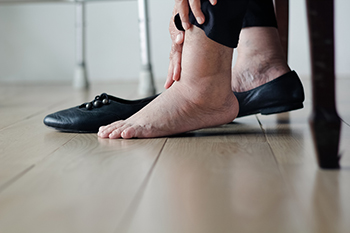
People who have swollen feet and ankles are generally aware of how uncomfortable they can be. There are various reasons why this can occur, including eating foods that have high levels of sodium, and taking certain medications. Additionally, pregnant women and people who are overweight may notice their feet are swollen, or it may happen as an allergic reaction from an insect bite. Mild relief can be found when salt intake is reduced in the diet, starting a gentle exercise routine, and frequently elevating the feet. It is beneficial to refrain from sitting or standing for long periods of time, in addition to wearing socks and shoes that are too tight. It can help to wear shoes that fit properly, and have a low heel and soft sole. Shiny skin on the feet can be a sign of edema, which is the medical term for swollen feet. Some people may experience a skin color change on their feet, and this may be a symptom of edema. If you have this condition, and you fail to find relief with the above suggestions, please consult with a podiatrist who can provide an examination and conclude with a proper diagnosis and treatment.
Swollen feet can be a sign of an underlying condition. If you have any concerns, contact Dr. Tupper of Coshocton Foot Health Center. Our doctor can provide the care you need to keep you pain-free and on your feet.
Swollen feet are a common ailment among pregnant women and people who stand or sit for extended periods. Aging may increase the possibility of swollen feet and patients who are obese often notice when their feet are swelling too. There may be medical reasons why swollen feet occur:
- Phlebitis - A condition that causes the veins to become inflamed and can also cause leg pain.
- Liver disease - This may lead to low blood levels of albumin which is a protein. This can cause fluid in the blood to pass into the tissues and several areas of the body can become swollen.
- Heart failure - When the heart doesn’t pump properly the blood that is normally pumped back to the heart can pool in the veins of the legs causing swollen feet.
- Kidney disease - One of the main functions of the kidneys is releasing excess fluid in the body. This type of condition can make it difficult for the kidneys to function properly, and as a result the feet may become swollen.
- Deep-vein thrombosis (DVT)- This is a serious condition where blood clots form in the veins of the legs. They can block the return of blood from the legs to the heart which may cause the feet to swell. It is important to be treated by a podiatrist if this condition is present.
Swollen feet can also be caused by bone and tendon conditions, including fractures, arthritis, and tendinitis. Additionally, there may be skin and toenail conditions and an infection may cause the feet to swell. Patients who take medicine to treat high blood pressure may be prone to getting swollen feet.
Many patients elevate their feet to help relieve the swelling and this is generally a temporary remedy. When a podiatrist is consulted the reason behind the swelling can be uncovered and subsequently treated.
If you have any questions please feel free to contact our office located in Coshocton, OH . We offer the newest diagnostic tools and technology to treat your foot and ankle needs.
Breaking Your Foot Is No Laughing Matter
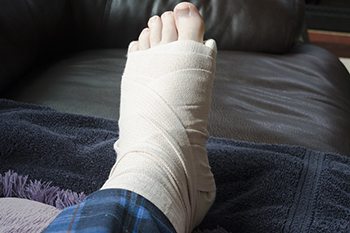
Though it can be funny to think of breaking your foot as a valid excuse to get out of going to an event you would rather skip, to actually break your foot is not funny at all. You can sustain a foot fracture from falling, moving quickly (such as in running or another sport), twisting your foot to one side, dropping something heavy on your foot, or enduring other injuries. When a fracture first happens, it is important to take weight off of the affected foot and elevate it. If you see a bone sticking out of your foot, your foot looks deformed in some other way, your foot is numb or cold, or you are in severe pain, make an appointment with a podiatrist as soon as possible. Your broken foot will usually be cast and/or put into a walking boot until it heals. Surgery may be required. A broken foot is something to take seriously. A podiatrist can ascertain the severity of the break and provide the best treatment option for you.
A broken foot requires immediate medical attention and treatment. If you need your feet checked, contact Dr. Tupper from Coshocton Foot Health Center. Our doctor can provide the care you need to keep you pain-free and on your feet.
Broken Foot Causes, Symptoms, and Treatment
A broken foot is caused by one of the bones in the foot typically breaking when bended, crushed, or stretched beyond its natural capabilities. Usually the location of the fracture indicates how the break occurred, whether it was through an object, fall, or any other type of injury.
Common Symptoms of Broken Feet:
- Bruising
- Pain
- Redness
- Swelling
- Blue in color
- Numbness
- Cold
- Misshapen
- Cuts
- Deformities
Those that suspect they have a broken foot shoot seek urgent medical attention where a medical professional could diagnose the severity.
Treatment for broken bones varies depending on the cause, severity and location. Some will require the use of splints, casts or crutches while others could even involve surgery to repair the broken bones. Personal care includes the use of ice and keeping the foot stabilized and elevated.
If you have any questions please feel free to contact our office located in Coshocton, OH . We offer the newest diagnostic and treatment technologies for all your foot and ankle needs.
Easy to Spot a Bunion
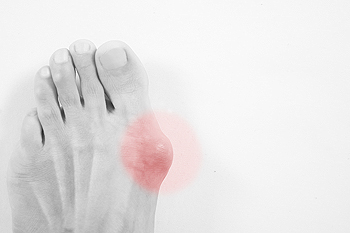
A bunion is easy to notice. It is classified as a deformity and is a bony protrusion on the side of the big toe. It can develop as a result of genetic factors or from wearing shoes that are too tight in the toe area. Research has shown it affects approximately 35% of people who are over 65 years old and may affect their quality of life if not promptly treated. The medical term for a bunion is called hallux valgus and happens when the first long bone of the foot meets the first bone of the toe. When this moves out of alignment, a bunion has formed. It often develops slowly and if it becomes severe it may shift the other toes toward each other. Flexibility and range of motion may negatively affect the foot, and the skin may become irritated. Some patients experience foot injuries, and this may lead to the development of a bunion. Additionally, existing medical conditions including flat feet and rheumatoid arthritis may increase the risk of getting a bunion. If you have noticed a bunion on your foot, it is strongly suggested that you are under the care of a podiatrist who can determine what the best course of treatment is for you, which may include surgery for permanent removal.
If you are suffering from bunions, contact Dr. Tupper of Coshocton Foot Health Center. Our doctor can provide the care you need to keep you pain-free and on your feet.
What Is a Bunion?
A bunion is formed of swollen tissue or an enlargement of boney growth, usually located at the base joint of the toe that connects to the foot. The swelling occurs due to the bones in the big toe shifting inward, which impacts the other toes of the foot. This causes the area around the base of the big toe to become inflamed and painful.
Why Do Bunions Form?
Genetics – Susceptibility to bunions are often hereditary
Stress on the feet – Poorly fitted and uncomfortable footwear that places stress on feet, such as heels, can worsen existing bunions
How Are Bunions Diagnosed?
Doctors often perform two tests – blood tests and x-rays – when trying to diagnose bunions, especially in the early stages of development. Blood tests help determine if the foot pain is being caused by something else, such as arthritis, while x-rays provide a clear picture of your bone structure to your doctor.
How Are Bunions Treated?
- Refrain from wearing heels or similar shoes that cause discomfort
- Select wider shoes that can provide more comfort and reduce pain
- Anti-inflammatory and pain management drugs
- Orthotics or foot inserts
- Surgery
If you have any questions, please feel free to contact our office located in Coshocton, OH . We offer the newest diagnostic and treatment technologies for all your foot care needs.
Changes to Your Feet as You Age
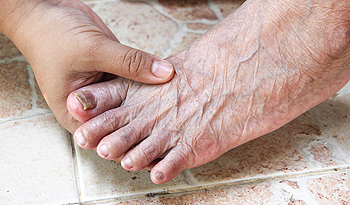
As people age, the body undergoes numerous changes, and changes to the feet are no exception. First, the skin becomes thinner, and you may notice joint pain you never had before from simple wear and tear. In addition, the muscles become weaker and less resilient. All this adds up to not being able to do many of the things that you used to do, or doing them more slowly and for shorter periods of time. Added to simply aging, certain conditions such as neuropathy, circulatory issues, and swelling of the feet (edema) may bring additional pain and increase the risk of injury or falling. The bones also begin to lose density, adding to the risk of fractures, especially in post-menopausal women. The fat pads in the heels and soles of the feet diminish, which may lead to such painful conditions as plantar fasciitis. Arthritis, an inflammation of the joints, may develop, causing more pain. Ways to stave off some of the effects of aging feet include finding footwear that fits properly and provides extra cushioning. Also, it is thought that foot and toe stretches help to keep the blood circulating and prevent swelling. Keeping your feet clean, dry, and moisturized can help you avoid infections. And watching your weight is important, as extra weight increases the load your feet have to support each time you take a step. For more information on taking care of your feet during your older years, please consult a podiatrist.
Proper foot care is something many older adults forget to consider. If you have any concerns about your feet and ankles, contact Dr. Tupper from Coshocton Foot Health Center. Our doctor can provide the care you need to keep you pain-free and on your feet.
The Elderly and Their Feet
As we age we start to notice many changes in our body, but the elder population may not notice them right away. Medical conditions may prevent the elderly to take notice of their foot health right away. Poor vision is a lead contributor to not taking action for the elderly.
Common Conditions
- Neuropathy – can reduce feeling in the feet and can hide many life-threatening medical conditions.
- Reduced flexibility – prevents the ability of proper toenail trimming, and foot cleaning. If left untreated, it may lead to further medical issues.
- Foot sores – amongst the older population can be serious before they are discovered. Some of the problematic conditions they may face are:
- Gouging toenails affecting nearby toe
- Shoes that don’t fit properly
- Pressure sores
- Loss of circulation in legs & feet
- Edema & swelling of feet and ankles
Susceptible Infections
Diabetes and poor circulation can cause general loss of sensitivity over the years, turning a simple cut into a serious issue.
If you have any questions please feel free to contact our office located in Coshocton, OH . We offer the newest diagnostic and treatment technologies for all your foot and ankle needs.
Keeping Senior Feet Healthy
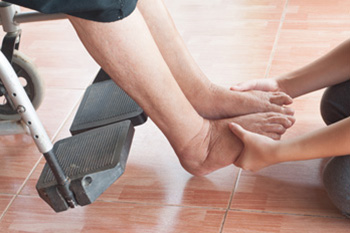
Healthy feet allow seniors to stay mobile and remain active and independent. Proper foot care is recommended for a lifetime but more importantly as one ages, as seniors are more prone to medical conditions and foot problems. For example, many seniors have diabetes and can be susceptible to nerve damage, infections, and poor circulation in their feet. Similarly, many in this age group suffer from some form of arthritis that causes foot pain. Daily foot care that will maintain the health of one’s feet include washing, drying, and moisturizing feet daily, and checking feet for cuts, blisters, or any problems that could lead to infection. Cutting toenails regularly and straight across to prevent ingrown toenails, wearing properly fitted footwear and soft cotton or wool socks to protect and cushion the feet, and staying active to maintain circulation in the legs and feet will also help. A podiatrist is a good medical professional to include on your healthcare team if you are a senior or providing care for the aged. Such a doctor can help in maintaining foot health, identify sources of foot discomfort, and suggest treatment options.
If you need your feet checked, contact Dr. Tupper of Coshocton Foot Health Center. Our doctor will attend to all of your foot and ankle needs and provide you with quality treatment.
Geriatrics and Podiatry
When people age, some common issues that may occur are bone density loss, dry skin, poor circulation, and rough brittle nails. These issues may also affect your foot health if the necessary steps are not taken to alleviate the problems.
It is important to take care of your feet because feet that are injured or diseased can affect your overall health. Having painful feet hinders your ability to do daily activities or may decrease your willingness to do the things that you need to do.
Visiting Your Geriatrician
As we age, health problems become more likely, so it is essential to visit your doctor for check-ups to ensure that you are doing the best you can to take care of your health. It is recommended to check your feet frequently for any possible cuts, bruises, swelling, corns or any other irregularities.
Taking Care of Elderly Feet
Cracked or dry feet can be treated by applying moisturizer often. It is also important not to wear old socks because the older the sock is, the higher the possibility there will be that there is bacteria there. Wear fresh socks and make sure they fit properly.
Proper foot health means that you can have a more active lifestyle and you will not be bogged down by pain. Foot health also leads to good circulation, which is paramount for overall health.
If you have any questions, please feel free to contact our office located in Coshocton, OH . We offer the newest diagnostic tools and technology to treat your foot and ankle needs.


